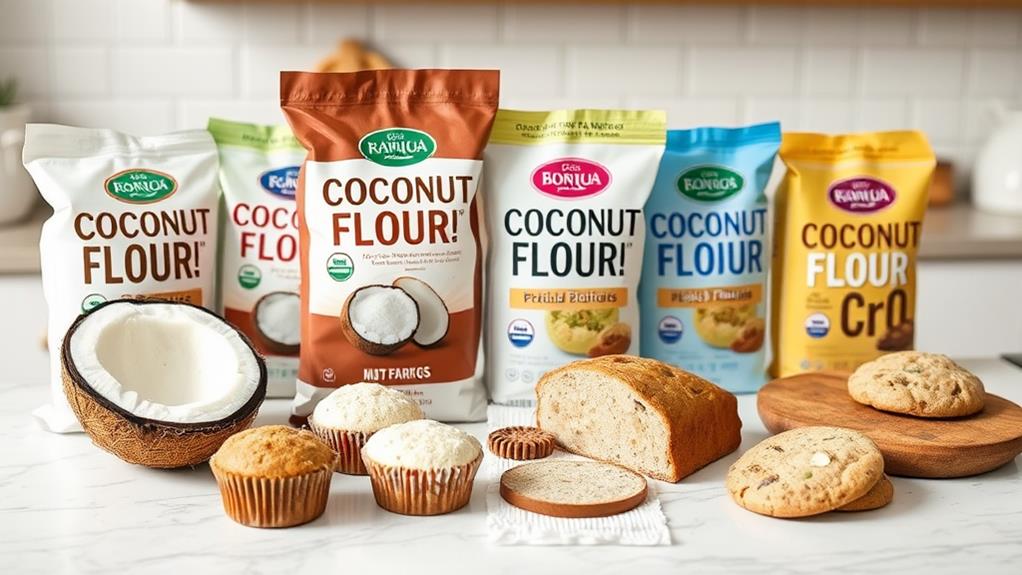When searching for the best coconut flours, you'll find several exceptional options. Viva Naturals Organic Coconut Flour stands out with its USDA Organic certification and versatile use in various diets. 365 by Whole Foods Market offers a high-quality option that meets strict standards and includes helpful recipe guidance. Wholesome Yum Premium Organic Coconut Flour is ideal for low-carb and keto diets, boasting only 2g net carbs per serving. Bob's Red Mill Organic Coconut Flour provides fair trade certified quality in a convenient 4-pack. Each brand offers unique benefits, from nutritional profiles to baking versatility. Dive deeper to discover which flour best suits your culinary needs.
Key Takeaways
- Viva Naturals Organic Coconut Flour is USDA Organic, Non-GMO Project Verified, and suitable for keto, paleo, and vegan diets.
- 365 by Whole Foods Market Organic Coconut Flour meets stringent quality standards and includes a coconut muffin recipe on packaging.
- Wholesome Yum Premium Organic Coconut Flour contains only 2g net carbs per serving and is suitable for multiple dietary needs.
- Bob's Red Mill Organic Coconut Flour is Fair Trade Certified™, comes in a value 4-pack, and has a mild coconut flavor.
- Consider factors like texture, absorbency, organic certification, nutritional profile, and packaging when choosing coconut flour.
Viva Naturals Organic Coconut Flour (4 lbs)
For health-conscious bakers seeking a versatile gluten-free alternative, Viva Naturals Organic Coconut Flour stands out. This USDA Organic, Non-GMO Project Verified, and Kosher product is ideal for keto, paleo, and vegan diets. Made from fresh organic coconuts, it's unbleached and unrefined, adding a mild sweetness to your recipes.
You'll find it's low in sodium and fat but high in fiber, making it perfect for low-carb diets. When baking, substitute 1 cup of wheat flour with ¼ cup of coconut flour plus an egg or egg substitute. Remember, it absorbs liquid considerably, so mix it with twice the volume of liquid for best results. While it's great for both sweet and savory dishes, some users suggest adding spices to mask the coconut scent if desired. Store it in an airtight container to prevent clumping and maintain freshness.
Best For: Health-conscious bakers and cooks following gluten-free, keto, paleo, or vegan diets who want a versatile, high-fiber flour alternative.
Pros:
- USDA Organic, Non-GMO Project Verified, and Kosher certified
- High in fiber and low in sodium and fat, suitable for low-carb diets
- Versatile for both sweet and savory recipes
Cons:
- Requires different ratios than wheat flour and may need additional liquid
- Strong coconut scent may not be desirable in all recipes
- Packaging may not seal properly, requiring transfer to an airtight container
365 by Whole Foods Market, Flour Coconut Organic, 16 Ounce
Health-conscious bakers and those on gluten-free diets will find 365 by Whole Foods Market's Organic Coconut Flour an excellent choice. This 16-ounce package offers a high-quality, organic alternative to traditional flour, meeting Whole Foods Market's stringent standards. You'll appreciate its versatility in baking, from cakes to muffins, and its suitability for keto and low-carb diets.
The coconut flour boasts a fine texture that mixes well and adds a pleasant flavor to your recipes. It's rich in fiber and provides a healthier option compared to bleached flour. While it contains some saturated fat, it's generally not a concern for most users. You'll find a coconut muffin recipe on the package to get you started. Keep in mind that some users have reported challenges with specific recipes, so you may need to experiment to achieve the best results.
Best For: Health-conscious individuals, gluten-free dieters, and those following keto or low-carb lifestyles looking for a versatile, organic alternative to traditional flour.
Pros:
- High in fiber and healthier than bleached flour
- Versatile for various baking applications, including cakes and muffins
- Meets Whole Foods Market's quality standards and is organic
Cons:
- May require experimentation to achieve desired results in some recipes
- Contains some saturated fat, which might be a concern for certain individuals
- Can be challenging to use in specific recipes, such as pizzelles
Wholesome Yum Premium Organic Coconut Flour (16 oz)
Keto enthusiasts and gluten-free bakers will find Wholesome Yum Premium Organic Coconut Flour an excellent addition to their pantry. This 16-ounce package offers a low-carb, non-GMO alternative to traditional flour, made from pure organic coconuts. With only 2g net carbs per serving and zero glycemic impact, it's perfect for those watching their carbohydrate intake.
You'll appreciate the versatility of this flour substitute, which works well in various recipes, from bread and pancakes to cookies and crackers. Its fine consistency and absorbency enhance the taste and texture of your baked goods. If you're following a specific diet, you'll be pleased to know it's compatible with paleo, vegan, and diabetic-friendly lifestyles. It's also a great option if you have almond allergies but still want to enjoy low-carb baking. With its high fiber and protein content, Wholesome Yum's coconut flour supports your healthy lifestyle goals.
Best For: Health-conscious individuals, keto dieters, and those with gluten sensitivities looking for a versatile, low-carb flour alternative for baking and cooking.
Pros:
- Made from 100% organic coconuts, ensuring high quality and purity
- Versatile for various recipes, from bread to cookies
- Rich in fiber and protein, supporting a healthy lifestyle
Cons:
- May require recipe adjustments due to high absorbency
- Coconut flavor might not suit all recipes
- More expensive than traditional wheat flour
Bobs Red Mill Organic Coconut Flour, 16 oz (Pack of 4)
Gluten-free bakers and low-carb enthusiasts will find Bob's Red Mill Organic Coconut Flour an excellent addition to their pantry. This finely ground, Fair Trade Certified™ flour offers a nutritious alternative to wheat, perfect for both sweet and savory recipes. You'll appreciate its mild coconut flavor and versatility in pancakes, cookies, and muffins.
When using this flour, remember it's highly absorbent and requires extra eggs in recipes. For best results, follow coconut flour-specific instructions or blend it with other nut flours. The 4-pack provides great value, with a 10-month shelf life and airtight packaging to maintain freshness. You'll enjoy consistent baking results and the peace of mind that comes with a high-quality, celiac-safe product. Whether you're following a low-carb diet or have nut allergies, Bob's Red Mill Organic Coconut Flour is a reliable choice for your gluten-free baking needs.
Best For: Gluten-free and low-carb bakers looking for a versatile, high-quality coconut flour for various recipes.
Pros:
- Fair Trade Certified™ and organic product
- Excellent value with 4-pack purchase
- Versatile for both sweet and savory recipes
Cons:
- Requires recipe adjustments due to high absorbency
- May impart a mild coconut flavor to baked goods
- Limited shelf life of 10 months
Factors to Consider When Choosing Coconut Flours

When you're selecting coconut flour, there are several key factors to evaluate. You'll want to assess the texture and consistency, check for organic certification, examine the nutritional profile, assess packaging and storage options, and compare prices for the best value. By weighing these aspects, you can choose a coconut flour that best suits your cooking needs and dietary preferences.
Texture and Consistency
Along with its nutritional benefits, the texture and consistency of coconut flour play essential roles in determining the quality of your baked goods. When choosing coconut flour, you'll find that brands offer varying degrees of fineness, which can greatly impact your recipes.
Opt for super fine coconut flour if you're looking to enhance absorbency and overall quality. This finer grind improves the flour's ability to blend seamlessly with other ingredients, resulting in a more desirable texture in your final products. Keep in mind that coconut flour is highly absorbent, so you'll need to adjust your recipes accordingly, often adding extra liquid or eggs to maintain proper moisture levels.
Consider how the texture of your chosen coconut flour will interact with other ingredients in your gluten-free baking. A smoother flour may yield different results compared to a coarser version. Additionally, be aware that coarser textures can intensify the coconut aroma and flavor, potentially influencing the overall taste of your baked items. By paying attention to texture and consistency, you'll be better equipped to select the right coconut flour for your specific baking needs.
Organic Certification
As you navigate the world of coconut flours, organic certification stands out as an essential factor to contemplate. When you choose organic coconut flour, you're ensuring that the product is made from coconuts grown without synthetic pesticides, herbicides, or GMOs. This certification adheres to strict agricultural standards set by regulatory bodies, promoting environmentally sustainable farming practices.
Organic coconut flour undergoes rigorous testing and verification processes to maintain its certification, giving you assurance of quality. By opting for organic, you're contributing to better health outcomes by reducing your exposure to harmful chemicals commonly used in conventional farming.
Moreover, organic certification often supports fair trade practices, empowering farmers and promoting ethical sourcing in the coconut flour industry. This means your choice can have a positive impact beyond just your personal health.
When shopping for coconut flour, look for trusted organic certifications on the packaging. These labels indicate that the product has met stringent requirements throughout its production process. By prioritizing organic coconut flour, you're not only making a healthier choice for yourself but also supporting sustainable and ethical practices in agriculture.
Nutritional Profile
The nutritional profile of coconut flour is an essential factor to take into account when selecting the right product for your needs. When you're choosing coconut flour, you'll want to take into consideration its high fiber content, which can greatly benefit your digestive health and help you feel fuller for longer. With around 5 grams of fiber per 2-tablespoon serving, it's an excellent option for those looking to increase their fiber intake.
If you're following a low-carb or keto diet, coconut flour's low carbohydrate content makes it an ideal choice. With only 2 grams of net carbs per serving, it won't derail your dietary goals. You'll also benefit from its higher fat content, primarily comprised of healthy saturated fats, which can support your energy needs.
For those concerned about blood sugar levels, coconut flour's low glycemic index is a considerable advantage. It won't cause rapid spikes in blood sugar, making it suitable for diabetics or anyone monitoring their glucose levels. Additionally, the moderate protein content in coconut flour provides a plant-based protein source, contributing to a well-rounded nutritional profile. Take these factors into account when choosing your coconut flour to guarantee it aligns with your dietary requirements and health goals.
Packaging and Storage
When selecting coconut flour, don't overlook the importance of packaging and storage. Proper packaging is vital, as coconut flour can be prone to clumping and moisture absorption if not sealed correctly. Look for brands that offer well-sealed packaging to maintain the flour's quality.
Once you've opened the package, transfer the coconut flour to an airtight container. This step is necessary to preserve its freshness and prevent it from drying out. Remember that coconut flour is highly absorbent and can be affected by humidity, so store it in a cool, dry place to maintain its quality.
Be aware of the shelf life of coconut flour, which is typically around 10 months. Always check the expiration date before purchasing and using it in your baking. To guarantee you're using fresh flour, regularly inspect it for signs of spoilage, such as off odors or clumping.
Price and Value
Smart shoppers know that price and value are essential factors when selecting coconut flour. As you compare options, you'll notice that prices can vary considerably. Larger packages often offer better value per ounce than smaller ones, making them a smart choice if you use coconut flour frequently or plan large baking projects.
Consider buying in bulk to reduce your overall costs. This approach is particularly beneficial for regular users. Some brands even offer subscription services, providing additional discounts for consistent purchases. When evaluating prices, don't forget to factor in the quality and sourcing of the flour. Higher-quality options may justify a slightly higher price point due to superior taste or nutritional value.
Keep an eye out for promotional deals and multi-pack options, as these can lead to substantial savings compared to buying single units. As you shop, calculate the price per ounce to verify you're getting the best value. Remember, the cheapest option isn't always the most economical in the long run. Balance cost with quality, packaging size, and your usage needs to find the coconut flour that offers the best overall value for your specific requirements.
Brand Reputation
Brand reputation stands as an essential factor when selecting coconut flour. When evaluating a brand's reputation, look for certifications like USDA Organic, Non-GMO Project Verified, and Fair Trade Certified. These labels signify a commitment to quality and ethical sourcing practices, giving you confidence in your purchase.
Don't overlook consumer feedback and reviews. They offer valuable insights into the flour's consistency, flavor, and performance in various recipes. Brands with a long history in specialty flours often have well-established quality control processes, ensuring their products meet your expectations for taste and texture.
Consider the brand's market availability and pricing. Competitive pricing often indicates a balance of quality and value, while widespread availability can reflect consumer trust and popularity. Pay attention to brands that provide clear usage instructions and recipe suggestions. This illustrates their expertise and commitment to helping you achieve the best results with their products.
Frequently Asked Questions
Can Coconut Flour Be Used as a Direct Substitute for All-Purpose Flour?
No, you can't use coconut flour as a direct substitute for all-purpose flour. It's much more absorbent and has different properties. You'll need to adjust your recipes considerably when using coconut flour. Typically, you'll use only about 1/4 to 1/3 the amount of coconut flour compared to all-purpose flour. You'll also need to increase the liquid and eggs in your recipe. It's best to follow recipes specifically designed for coconut flour or experiment carefully to get the right balance.
Does Coconut Flour Have a Strong Coconut Flavor?
As smooth as silk, coconut flour doesn't pack the punch you might expect. While it does have a subtle coconut flavor, it's not overpowering. You'll notice a slight sweetness and nuttiness, but it won't turn your baked goods into a tropical paradise. The taste is mild enough that you can use it in both sweet and savory recipes without worry. If you're looking for a stronger coconut flavor, you'll need to add it separately.
How Long Does Coconut Flour Typically Last When Stored Properly?
Coconut flour can last quite a while when you store it properly. Typically, you'll find it stays fresh for 6-12 months in your pantry when kept in an airtight container. However, if you refrigerate it, you can extend its shelf life to up to 18 months. For even longer storage, try freezing it – it'll keep for up to 2 years! Just remember to check for any signs of spoilage, like an off smell or mold, before using.
Is Coconut Flour Suitable for People With Nut Allergies?
Picture a golden, fluffy pancake stack wafting its sweet aroma through your kitchen. You're excited to dig in, but you're worried about your nut allergy. Good news! Coconut flour is generally safe for you. It's not a true nut but a fruit seed. However, you should still exercise caution. While rare, some people with tree nut allergies may react to coconut. It's always best to consult your allergist before introducing coconut flour into your diet.
Can Coconut Flour Be Used in Savory Dishes, or Just Sweet Recipes?
You'll be pleased to know that coconut flour isn't limited to sweet treats. It's incredibly versatile and works well in savory dishes too. You can use it to thicken sauces, coat meats for frying, or add it to soups and stews. It's great for making gluten-free bread, pizza crusts, and even as a base for savory pancakes. Don't hesitate to experiment with coconut flour in your favorite savory recipes for a unique twist.








